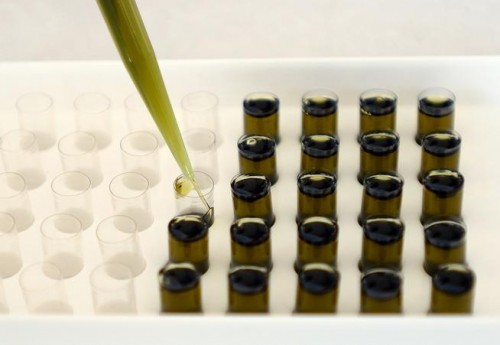Experimental marijuana-based drug Epidiolex significantly reduced convulsive seizures among epilepsy patients in a recent clinical trial, according to GW Pharmaceuticals, the U.K. company that makes the drug.
Among the drug’s primary ingredients is cannabidiol, better known as CBD, a non-psychoactive marijuana derivative that is anecdotally known for helping some patients suffering from epilepsy, Crohn’s and other diseases. There is little scientific evidence backing up patients’ experiences with CBD, which is one of the reasons GW Pharmaceuticals’ first-of-its-kind study is so important.
The latest on medical cannabis research
Multiple sclerosis: CSU researcher goes to crowdfunding for study on pot and MS patients
Migraines: Migraines reduced with medical marijuana, Colorado study finds
Depression, anxiety: Smoking pot doesn’t make you anxious or depressed, study says
Epilepsy: Two studies on CBD use for epilepsy show encouraging results
NEW: Get podcasts of The Cannabist Show.
Subscribe to our newsletter here.
Watch The Cannabist Show.
Epidiolex is being studied to treat Dravet syndrome, a rare type of epilepsy for which there are currently no treatments approved in the U.S. GW Pharmaceuticals is currently in talks with federal regulators, hoping that Epidiolex will be introduced to the U.S. market — which would make it the first prescription drug in America that is extracted from cannabis.
“The results of this Epidiolex pivotal trial are important and exciting as they represent the first placebo-controlled evidence to support the safety and efficacy of pharmaceutical cannabidiol in children with Dravet syndrome, one of the most severe and difficult-to-treat types of epilepsy,” Orrin Devinsky, M.D., of New York University Langone Medical Center’s Comprehensive Epilepsy Center and the trial’s principal investigator, said in a statement. “These data demonstrate that Epidiolex delivers clinically important reductions in seizure frequency together with an acceptable safety and tolerability profile, providing the epilepsy community with the prospect of an appropriately standardized and tested pharmaceutical formulation of cannabidiol being made available by prescription in the future.”
CBD as a treatment for epilepsy patients has been mainstream since CNN’s Sanjay Gupta in 2013 made Colorado-based toddler Charlotte Figi, who suffers from Dravet syndrome, the subject of his first “Weed” documentary. The non-traditional and often illegal epilepsy treatment option was the subject of online forums for years before that.

Some scientists say CBD “quiets the excessive electrical and chemical activity in the brain that causes seizures,” according to CNN. And while most scientists would agree that more research is needed, the director of the National Institute on Drug Abuse is optimistic that CBD has legitimate medical potential.
“Pre-clinical research has indeed suggested that CBD may have a range of therapeutic effects, most notable of which are anti-seizure, neuroprotective, anti-inflammatory, analgesic, anti-tumor, anti-psychotic and anti-anxiety relieving properties,” NIDA director Nora Volkow told a Drug Caucus hearing in June 2015 that discussed the barriers to cannabidiol research.
Volkow has long spoken cautiously about cannabis’ medical efficacy and efforts in U.S. states to legalize marijuana medically or recreationally. But Volkow told senators and others at the hearing that “CBD may be effective in treating children with drug-resistant epilepsy” and she even mentioned Epidiolex by name when she mentioned that “more than 400 children are receiving Epidiolex, a purified CBD extract, under an expanded access program, and the descriptive results are also encouraging.”
“However,” Volkow said, “proof of therapeutic efficacy requires demonstrations with large randomized clinical trials that control for unexpected effects.”
Watch Volkow’s comments at the 1:01:25 mark:
The Epidiolex study had half of its 120 participants, whose average age was 10 years old, on the study drug and the other half on a placebo. The participant patients were taking an average of three other anti-epileptic medications and had an average of 13 convulsive seizures per month.
Those taking Epidiolex saw a reduction of monthly convulsive seizures of 39 percent while those on the placebo saw a reduction of 13 percent, a statistically significant difference, wrote GW Pharma.
The executive director of the Dravet Syndrome Foundation was “thrilled” the Epidiolex clinical study showed such positive results.
“Dravet syndrome is one of the most catastrophic types of epilepsy in children and safe and effective treatments are desperately needed,” the Dravet Syndrome Foundation’s Mary Anne Meskis said in a statement. “We are thrilled to learn of these positive results, which bring much needed hope to the children and families who have been living with these debilitating seizures.”
Epidiolex, GW Pharma says, “has both Orphan Drug Designation and Fast Track Designation from the U.S. Food and Drug Administration in the treatment of Dravet syndrome.”
GW Pharmaceuticals CEO Justin Gover said the company is taking this study to the FDA to discuss his company’s regulatory submission. The company already sells another marijuana-based pharmaceutical, Sativex, to treat spasticity associated with multiple sclerosis — but the drug has not yet been approved for sale in the U.S.
